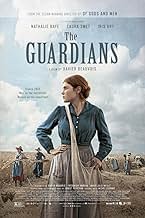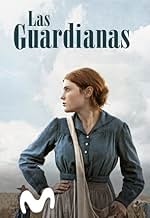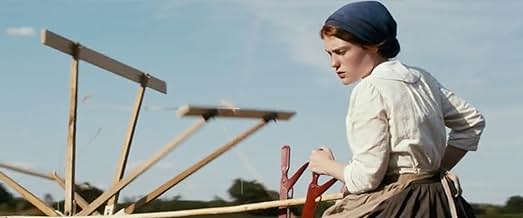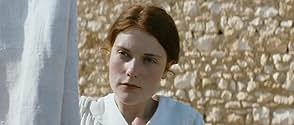CALIFICACIÓN DE IMDb
6.7/10
2.7 k
TU CALIFICACIÓN
Agrega una trama en tu idiomaWomen are left behind to work a family farm during the Great War.Women are left behind to work a family farm during the Great War.Women are left behind to work a family farm during the Great War.
- Dirección
- Guionistas
- Elenco
- Premios
- 11 nominaciones en total
Mathilde Viseux
- Marguerite Sandrail
- (as Mathilde Viseux-Ely)
Opiniones destacadas
In his film "Of Gods and Men," director Xavier Beauvois tells the story of seven Roman Catholic French Trappist monks kidnapped by radical Islamists from their monastery in a village in Algeria during the Algerian Civil War, and the sacrifices that people of good will in both religions were willing to make. Sacrifice is also a theme of Beauvois latest film, The Guardians, his first film shot in digital. It is a superbly realized and emotionally engaging film that dramatizes the strength and courage of the women left behind during World War I when all able-bodied men were fighting in the trenches. A quiet, contemplative film, it is beautifully photographed by Caroline Champetier ("The Innocents") who captures the bucolic loveliness of the Limousin area of south central France.
Now part of the new region of Nouvelle-Aquitaine, it is the least populated region of Metropolitan France and most likely has not changed much since the years in which the film takes place. Based on a 1924 novel by war veteran Ernest Pérochon, Beauvois and his co-writers Frédérique Moreau and Marie-Julie Maille gradually reveal the impact of the war on one family whose two sons and son-in-law have left for the front. Supported by a moving score by Michelle Legrand ("The Price of Fame"), the film covers a period of five years from 1915 to 1920, the years during and following the Great War in Europe, one that would claim an estimated 45 million military dead and wounded and 7.7 million missing or imprisoned.
The film opens in 1915 in a combat zone where we see the bodies of dead soldiers lying in the mud. The scene abruptly shifts to the Paridier farm in France, a place of quiet beauty that stands in sharp contrast to the heartbreak of the battlefield. It is a difficult time for the farm run by widowed matriarch Hortense Sandrail (Nathalie Baye, "Moka") with the help of her daughter Solange (Laura Smet, "Yves Saint-Laurent," Baye's real-life daughter) and her elderly father Henri (Gilbert Bonneau). Beauvois shows the heroism of the women furrowing, seeding, harvesting, grinding wheat, and taking it to market. It is backbreaking work and will be years before combines and tractors are introduced.
As the men periodically return home on leave, it becomes clear that each of them is damaged in some way. Hortense's oldest son Constant (Nicholas Giraud, "Anton Chekhov 1890"), a former schoolteacher, tells his mother that he endured, "two years of hell, some people went mad," and says without any evidence that "after the war, it will be different." Clovis (Olivier Rabourdin, "My Golden Days"), Solange's husband drinks heavily and stands up for the humanity of the Germans ("they are just like us") in opposition to the feelings of the family and the community. Finally, it is Hortense's son Georges (Cyril Descours, "Red Sky") who carries himself with a certain pride and even arrogance.
Frustrated by the need for another person to help her run the farm during the harvest season, Hortense hires Francine, a twenty-year-old auburn-haired orphan, remarkably performed by newcomer Iris Bly. In addition to the chores, Hortense must contend with some rowdy American soldiers stationed in the village awaiting their orders, while also looking after Marguerite (Mathilde Viseux), Clovis's daughter from his first marriage. Complications arise when Francine and George fall in love, much to the chagrin of the much younger Marguerite, assumed to be the girl that George would marry. The friction between members of the family forms the centerpiece of the film and Beauvois weaves a complex and unpredictable story without resorting to melodrama.
Unfortunately, when the town's rumor mill goes into high gear spreading all kinds of rumors, Francine's future is left on shaky ground. Even more disturbing is the sad news from the front delivered by a local official who just appears at the door. As events unfold, we are drawn closer to each character, able to relate to their hopes and sorrows as if we have known them all of their lives. Though The Guardians is a film of subtlety and restraint, it is also a work of compelling emotional force and one of the year's best films.
Now part of the new region of Nouvelle-Aquitaine, it is the least populated region of Metropolitan France and most likely has not changed much since the years in which the film takes place. Based on a 1924 novel by war veteran Ernest Pérochon, Beauvois and his co-writers Frédérique Moreau and Marie-Julie Maille gradually reveal the impact of the war on one family whose two sons and son-in-law have left for the front. Supported by a moving score by Michelle Legrand ("The Price of Fame"), the film covers a period of five years from 1915 to 1920, the years during and following the Great War in Europe, one that would claim an estimated 45 million military dead and wounded and 7.7 million missing or imprisoned.
The film opens in 1915 in a combat zone where we see the bodies of dead soldiers lying in the mud. The scene abruptly shifts to the Paridier farm in France, a place of quiet beauty that stands in sharp contrast to the heartbreak of the battlefield. It is a difficult time for the farm run by widowed matriarch Hortense Sandrail (Nathalie Baye, "Moka") with the help of her daughter Solange (Laura Smet, "Yves Saint-Laurent," Baye's real-life daughter) and her elderly father Henri (Gilbert Bonneau). Beauvois shows the heroism of the women furrowing, seeding, harvesting, grinding wheat, and taking it to market. It is backbreaking work and will be years before combines and tractors are introduced.
As the men periodically return home on leave, it becomes clear that each of them is damaged in some way. Hortense's oldest son Constant (Nicholas Giraud, "Anton Chekhov 1890"), a former schoolteacher, tells his mother that he endured, "two years of hell, some people went mad," and says without any evidence that "after the war, it will be different." Clovis (Olivier Rabourdin, "My Golden Days"), Solange's husband drinks heavily and stands up for the humanity of the Germans ("they are just like us") in opposition to the feelings of the family and the community. Finally, it is Hortense's son Georges (Cyril Descours, "Red Sky") who carries himself with a certain pride and even arrogance.
Frustrated by the need for another person to help her run the farm during the harvest season, Hortense hires Francine, a twenty-year-old auburn-haired orphan, remarkably performed by newcomer Iris Bly. In addition to the chores, Hortense must contend with some rowdy American soldiers stationed in the village awaiting their orders, while also looking after Marguerite (Mathilde Viseux), Clovis's daughter from his first marriage. Complications arise when Francine and George fall in love, much to the chagrin of the much younger Marguerite, assumed to be the girl that George would marry. The friction between members of the family forms the centerpiece of the film and Beauvois weaves a complex and unpredictable story without resorting to melodrama.
Unfortunately, when the town's rumor mill goes into high gear spreading all kinds of rumors, Francine's future is left on shaky ground. Even more disturbing is the sad news from the front delivered by a local official who just appears at the door. As events unfold, we are drawn closer to each character, able to relate to their hopes and sorrows as if we have known them all of their lives. Though The Guardians is a film of subtlety and restraint, it is also a work of compelling emotional force and one of the year's best films.
"Two years of hell, some people went mad." "After the war, it will be different." Constant (Nicolas Girard)
The WWI soldier, Constant, in director Xavier Beauvois' The Guardians, captures the ambivalence of the "the war to end all wars": combat insanity that comes home with soldiers and the hopeless hope the world will be a better place. The only "better" is the film's depiction of strong women taking the reins of a farm, modernizing it and making a profit.
It's a small village whose story begins in 1915 and ends in 1920 in rural France, just long enough for women to take prominent places in the farms at home and for their returning men to find adjustment a challenge as they carry the memories of unspeakable horrors in the trenches of that "great war."
Hortense (Nathalie Bye), an aging owner of a working farm, rides the plow while she attends to the politics of the large farm without the crutch of a domineering male. She does well enough to engage the services of a young maid, Francine (Iris Bry), who is a change agent for Hortense and her soldier son and a signal of the complications war brings to the world.
The cinematography is a perfect reflection of the tranquil country side lost in a trance of bucolic tasks until the war's change agents arrive. Leave it to French cinema to languish over faces and landscapes, as if Manet or Constable were the artistic director. The slowly panning shots of laborers are as softly powerful as paintings in the camera's movement.
The Guardians is one of the most beautifully photographed and quietly told stories of women abiding the tyranny of war with an aplomb unseen in modern cinema. This minimalist epic is one of the year's best films and an appropriate emblem of the French ability to make cinema art. All other cinema pales by comparison.
The WWI soldier, Constant, in director Xavier Beauvois' The Guardians, captures the ambivalence of the "the war to end all wars": combat insanity that comes home with soldiers and the hopeless hope the world will be a better place. The only "better" is the film's depiction of strong women taking the reins of a farm, modernizing it and making a profit.
It's a small village whose story begins in 1915 and ends in 1920 in rural France, just long enough for women to take prominent places in the farms at home and for their returning men to find adjustment a challenge as they carry the memories of unspeakable horrors in the trenches of that "great war."
Hortense (Nathalie Bye), an aging owner of a working farm, rides the plow while she attends to the politics of the large farm without the crutch of a domineering male. She does well enough to engage the services of a young maid, Francine (Iris Bry), who is a change agent for Hortense and her soldier son and a signal of the complications war brings to the world.
The cinematography is a perfect reflection of the tranquil country side lost in a trance of bucolic tasks until the war's change agents arrive. Leave it to French cinema to languish over faces and landscapes, as if Manet or Constable were the artistic director. The slowly panning shots of laborers are as softly powerful as paintings in the camera's movement.
The Guardians is one of the most beautifully photographed and quietly told stories of women abiding the tyranny of war with an aplomb unseen in modern cinema. This minimalist epic is one of the year's best films and an appropriate emblem of the French ability to make cinema art. All other cinema pales by comparison.
I was smitten by Iris Bry as Francine and entranced by the film, thinking about French landscape from a different point of view in those war years. If you love film, sit back and enjoy a wonderful story that differs from the usual WW1fare.
Xavier Beauvois back in the 1990's made a very good film ' N'oublie pas que tu vas Mourir '. I saw it at a Florence film festival and was impressed especially as it approached the subject of AIDS from a heterosexual perspective. AIDs, drugs in Amsterdam and the former Yugoslavian civil wars was quite a combination, and for me it worked. It was stark and not made as a crowd pleaser and I admired him for it. I have lost track of his work since then, but after being on the shelf for a while I watched ' Les Gardiennes '. At first I was impressed by the routine lives set in rural France during WW1 and how the women coped with their lives, fathers and sons fighting. But as the film progressed I got bored with the prettiness of the photography and also the music which was bland given the subject matter. The central point of interest was the predicament of the character played very well by Iris Bry, and her unfair endurance at the hands of a so called ' normal ' family. Keeping the family together at all brutal costs is not in my code of existence, and Nathalie Baye ( excellent as always ) as the mother turned from understandable grief at the loss of a son to a moral monster. The young woman's predicament was distantly related to Thomas Hardy's ' Tess of the D'Urbervilles ' and her resilience similar, although fortunately she does not end up on the gallows. All the same the complicit togetherness of the family structure fortified by the mother repelled me, and the last scene of the film with its perfunctory open ended optimism stretched endurance to its limit. Overall the film seemed swamped by its ' beauty ' and no doubt many have liked that approach. The brief and truthfully shown war scene where all men on either side are seen as equals in the needlessly cruel hands of those who caused it was excellently portrayed. The pity of war was apparent. The pitiless huddling together of the remaining ' family ' was not. A 6 for the portrayal of the cyclic seasons and the long painful years which is rarely done in the cinema, and with less picture postcard photography and a less barbaric family I could have given it a 10.
Photography is beautiful and the actors do their best with a script which is anaemic in comparison with the novel on which the film is based. Many of the more interesting characters in the book are omitted, along with half of the setting - the people who live on the waterways. The ending is unbelievable.
¿Sabías que…?
- TriviaThe film, starring Nathalie Baye and her real life daughter Laura Smet, was released the same day Johnny Hallyday, Laura's father, died.
- ErroresIn the opening scene, which is set in 1915, the dead German soldiers are wearing the later style helmets that were not introduced until at least a year later.
- Bandas sonorasLa Chanson des Blés d'Or
Music by Frédéric Doria
Lyrics by Camille Soubise and L. Lemaître
Performed by Iris Bry
Selecciones populares
Inicia sesión para calificar y agrega a la lista de videos para obtener recomendaciones personalizadas
- How long is The Guardians?Con tecnología de Alexa
Detalles
- Fecha de lanzamiento
- Países de origen
- Sitios oficiales
- Idiomas
- También se conoce como
- The Guardians
- Locaciones de filmación
- Montrol-Sénard, Haute-Vienne, Francia(village church and school)
- Productoras
- Ver más créditos de la compañía en IMDbPro
Taquilla
- Presupuesto
- EUR 8,900,000 (estimado)
- Total en EE. UU. y Canadá
- USD 177,331
- Fin de semana de estreno en EE. UU. y Canadá
- USD 7,479
- 6 may 2018
- Total a nivel mundial
- USD 4,167,608
- Tiempo de ejecución2 horas 18 minutos
- Color
- Relación de aspecto
- 2.39 : 1
Contribuir a esta página
Sugiere una edición o agrega el contenido que falta

Principales brechas de datos
By what name was Les gardiennes (2017) officially released in India in English?
Responda


























